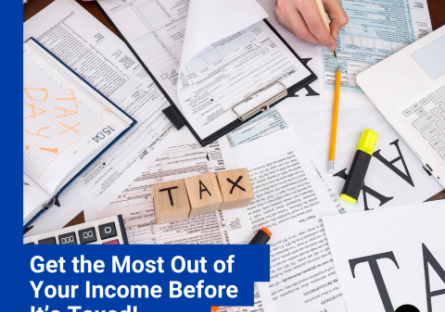
The dreaded tax season is upon us. To make the most of your tax returns and keep as much money as possible in your own pockets, consider following these simple guidelines all of which will help reduce your ‘taxable’ income.
- Donations
If you are in a position to give back, there are many ways to do so. Consider things you are passionate about and find charitable organizations that cater to those areas - homeless, pets, children - you name it, there is a charity for it. For non-monetary donations, do some purging and donate items you no longer need or want to a local donation center. You’d be surprised at what you can write off on your taxes.
- Tax Deductions
If you choose to itemize your tax deductions, there are many items that you can write off on your taxes. Expenses related to medical, business, and education can be deducted, along with retirement savings and investments. These tax deductions are subtracted from your taxable income.
- Tax Credits
A tax credit is very different from a deduction. While a deduction is applied before your taxable income, a credit is applied to the amount owed and comes directly off of what you owe in taxes, dollar for dollar.
- Max Out Your Accounts
Whether it be your retirement accounts, flexible spending account, health saving account or other qualifying accounts, max them out to lower your taxable income. The FSA is the only one you’ve got to watch closely because if you don’t use the money you put into the account, you will lose it when the new year starts. Other accounts, like the HSA have a roll-over feature.
- Know Your Real Estate
When buying and/or selling a home, it’s important to know how it will affect your taxes. Mortgage interest is deductible and if you’ve owned your home for at least two years, the net gain is also tax free.
Want to Learn More About Taxes?
Paradise Valley Community College offers both an associate degree and certificate of completion in accounting. With a two-year degree in Accounting, you can begin working immediately in high-demand, entry-level positions including bookkeeping, tax preparation, and
many clerking positions in accounts payable/receivable, claims, payroll, credit. As you gain experience working in your chosen field, you may choose to continue your education and prepare for certification in higher professions such as a Certified Bookkeeper (CB), a Certified Payroll Professional (CPP), or an Enrolled Agent (EA).
New Enrolled Agent Program at PVCC
Beginning Fall 2021, Paradise Valley Community College is offering an Enrolled Agent Certificate of Completion. Becoming certified as an EA is a great way to take your accounting skills to the next level. In just one year, you can become a federally licensed tax preparer and earn their EA designation. The program is two semesters of nine credits each, including hands-on internship experience. Many PVCC students work in the field as an EA while
completing their Accounting AAS.
For more information on tax preparation or accounting classes offered at PVCC, contact Lynn F. Clark, CPA, Residential Faculty in Accounting, at lynn.clark@paradisevalley.edu. Information can also be found on PVCC’s website at https://www.paradisevalley.edu/degrees-certificates/accounting-banking-….